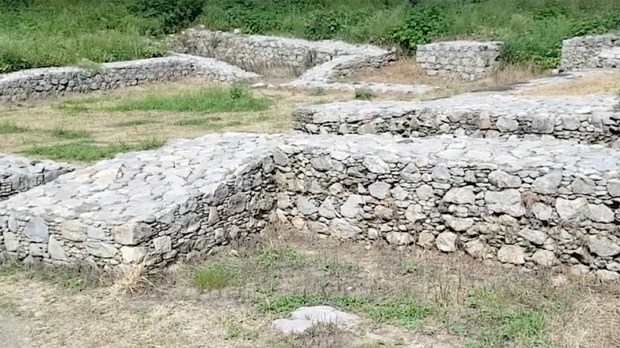Lenten Campaign 2025
This content is free of charge, as are all our articles.
Support us with a donation that is tax-deductible and enable us to continue to reach millions of readers.
At the archaeological site of Sirkap, in the Punjab province of Pakistan, stands the High Throne of St. Thomas the Apostle. Appearing to be little more than a stone retaining wall, it is believed to have been constructed by St. Thomas himself during his missionary journey to Pakistan, around the turn of the 2nd century.
Little is known of St. Thomas’ journey to Pakistan and India, save for what was related in the Acts of St. Thomas, an early 3rd -century apocryphal text that Kamran Chaudhry of UCA news reports was discovered in Syria in 1822. The story, which is not endorsed by the Catholic Church, goes that on his way to India St. Thomas visited the court of King Gondophares of Taxila, who entrusted St. Thomas with a small fortune and the task of building Gondophares a new palace.
St. Thomas fell out of the king’s graces when he gave away all the money without laying a stone. The king was ready to order St. Thomas to be executed when his brother had a brush with death and was miraculously revived. Gondophares’ brother told the king that he saw heaven while he was dead and that St. Thomas had built a palace for him there. Soon after, St. Thomas was forgiven and the entire kingdom was converted to Christianity.
While the legend is not widely accepted, Chaudhry reports that the tale has led to Sirkap becoming a pilgrimage site for Pakistani Christians, and even some other faiths who revere St. Thomas. Faithful travel for miles to pray at the Throne of St. Thomas and baptisms are held at the site for babies and adults.
Today, Sirkap is protected under the Antiquities Act, passed by the Pakistani government in 1975, and is a UNESCO World Heritage Site. Despite its historical status and regional popularity, Sirkap has not received the funding it needs for upkeep and preservation. However, this may change as the Pakistan Catholic Bishops Conference (PCBC) has offered its assistance, in exchange for custody of the site.
Archbishop Joseph Arshad, president of the PCBC, proposed that the Church could pay the taxes on the land, as well as the upkeep, and even suggested that they could build a shrine on the site. Prime Minister Imran Khan, who seemed interested in the offer, gave no definitive answer, but told the PCBC that he would discuss the option with his cabinet.
Regardless of the apocryphal text that identified the site as significant for Christians, Sirkap has become an important place for Pakistani Christians, who believe that the legend deepens their historical connection to the faith. Pastor Shahid P. Meraj, dean of the Anglican Cathedral Church of the Resurrection in Lahore, noted that Christianity in Pakistan is usually regarded as a labor of 16th-century Christian missionaries. He said:
“But the seed of faith was actually planted in our region from the times of the Apostles. We are not imported — we are the actual heirs.”
For more information on this fascinating story, visit UCA News to read Kamran Chaudhry’s article. For a view of the site,
.
